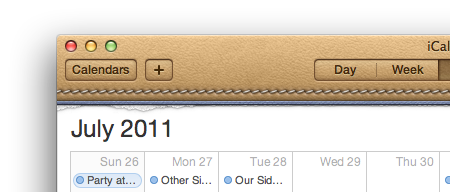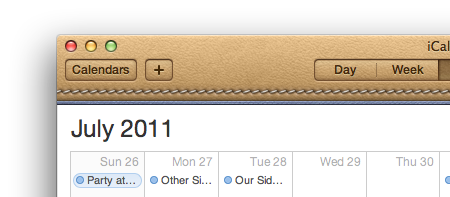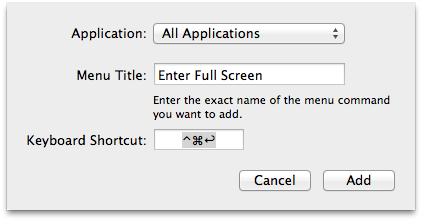OS X Lion brings dramatically redesigned versions of the classic iCal and Address Book applications. Many people, or at least some important decision makers inside Apple, are very happy with these changes. Other folks, such as myself, believe they look and behave like crap.
When I first saw the Lion version of iCal, my eyes were drawn to the obnoxious bits of paper that cling to the top of the window, artificially and pointlessly leaving the debris that you might find on a real-life calendar with removable paper sheets:

As Cathy Shive pointed out in her NSConference talk on user interface metaphors, the presence of junk like this in an application is at best useless, at worst distracting and detrimental to the usability of the application. I remember her saying in her talk, before Lion’s iCal had even been presented in a private developer beta, that little things like paper scraps in an application are particularly annoying because she always wants to try to pick them off just as she would with a physical object.
Lion has given me the opportunity to empathize deeply with that concern. I hate those cruddy paper bits, and I can’t pick them off! Or can’t I?
To clean up your copy of iCal on Lion:
- Select the iCal application in the Finder and press cmd-D to duplicate (make a backup, for safe keeping).
- Control click the application icon and select “Show Package Contents.”
- Navigate to Contents/Resources/
- Select “CanvasTopTile.png” and open it up in Acorn or another, less attractive image editor. Or download my edited version and replace the original file.
- Select the paper bits and “clean them up” by deleting them.
- Reopen iCal, and bask in the glow of your clean white calendar:

Granted, this only fixes the paper bits. You’re still stuck with that horrendous tan leather toolbar. But at least that doesn’t beg to be picked at. It’s worth noting that the tan leather can also be tweaked by editing a variety of other image resources in the bundle. It’s trickier because many of the graphical components of the toolbar are designed to blend with the leather background, so you’ll end up having to change quite a few of the images.
I’m reminded of another great observation Cathy made in her talk: when you make very stylistic choices like this for a user interface, you dramatically increase the variety of reasons that the customer can be repulsed by the design. What if I don’t like leather? What if I don’t like tan leather? What if I prefer a running stitch to an outline stitch? You can argue that matte grays and subdued color gradients may invite the same controversy, but there’s a reason they are so common in user interfaces: because they’re far less likely to distract from the form and function of the application itself.
Addendum: Updating the iCal code signature. Thanks to rentzsch and daagaak on Twitter for pointing out that editing the resource will break the “code signature” on the application, put there by Apple to assure users that the application 1. Was developed by Apple, and 2. Has not been modified by anybody but Apple. You can re-sign the application after tweaking it, to put it back into a “signed” state, albeit not by Apple. Hopefully this will prevent it from prompting you all the time about approving connections to services like MobileMe. From the Terminal:
codesign -f -s - /Applications/iCal.app
This reveals how little things like tweaking an application’s resources have wider-reaching consequences than they used to. I’m pretty sure you won’t miss any functionality in iCal by using a self-signed copy of the app vs. an Apple-signed version. But I could be wrong!




